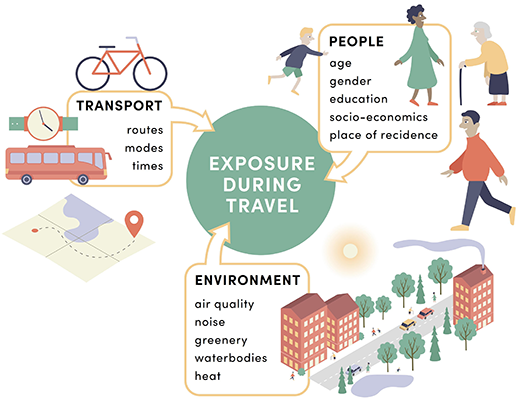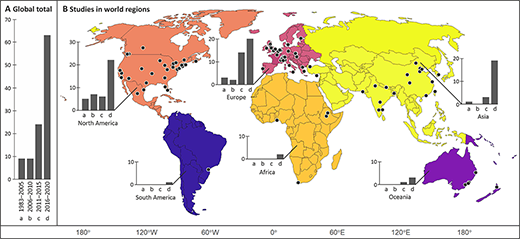| May 24, 2021 |
Environmental exposure during travel
|
|
(Nanowerk News) Environmental exposure during travel is an emerging research field with strong contribution potential to urban and transport planning. The new research field benefits from contemporary location-aware sensor technology that enables to collect data about both human mobility and environmental conditions.
|
|
The University of Helsinki Digital Geography Lab researchers published a seminal review article of the emerging research field of environmental exposures during daily travel. The article published in the journal Health & Place ("Environmental exposure during travel: A research review and suggestions forward") highlights that a better understanding of the dynamics of environmental exposures during travel, and their social and health outcomes would help improve the liveability and sustainability of our cities through evidence-based transport and urban planning.
|
|
A good global coverage of research supports local planning and governance, and better mitigates the risk of environmental health disparities in all parts of the world.
|
 |
| Environmental exposure during travel is an interplay between people, their travel behaviour, and the surrounding travel environment. Understanding environmental exposures during travel calls for spatially and temporally detailed data on all aspects, on human scale. (Image): Poom et al. 2021)
|
|
“Environmental exposure research is valuable both for urban and transport planners as well as for individuals. Knowing how our travel choices expose us to either harmful or beneficial environmental conditions, and how to access healthy and pleasant travel environments in different parts of the city helps us make healthy travel choices,“ says postdoctoral researcher Age Poom, the lead author of the article.
|
|
The authors identified 104 peer-reviewed journal articles worldwide that address environmental exposure during daily travel. The key methodological challenge of the research field is the spatiotemporal coupling of travel and environmental data. Different travel modes, routes, and times expose people to different environmental conditions. Detailed data on travel and environment is necessary for understanding exposure during travel.
|
|
The research field has strongly benefitted from the emerging location-aware sensor technology to capture the dynamics of both travel behaviour as well as environmental conditions. “The future research could take the advantage of mobile Big Data to examine travel-related exposure also at the scale of populations,” says the PhD candidate Elias Willberg, one of the co-authors of the paper.
|
|
The review showed that most of the travel-related exposure research focuses on air pollution. Exposure to other environmental conditions, such as traffic noise or street-level greenery, has received only little scholarly attention. Even less is known about the patterns of multiple and cumulative environmental exposures during travel.
|
|
More research attention is needed on the associations between travel behaviour, multiple environmental exposures, and resulting health and wellbeing effects. The future research should aim to develop shared and standardised study protocols as well as provide open data sets to make travel-related exposure studies comparable and draw conclusions of health and wellbeing effects through dedicated meta-analyses.
|
 |
| The number of studies published globally in different year ranges (A), and the spatial distribution of studies in different world regions using the same year ranges for the bars (B). The locations of individual study sites are indicated as points on the map (B). (Image: Poom et al. 2021) (click on image to enlarge)
|
|
“We conclude in our review that there is a need to overcome disciplinary silos and integrate the expertise of exposure and health researchers, environmental scientists, transport and geospatial researchers, and sustainability and welfare scholars. This would advance not only the research field but also the liveability of our cities,” concludes Tuuli Toivonen, the professor in geoinformatics.
|
|
Digital Geography at the University of Helsinki is an interdisciplinary research team focusing on spatial Big Data analytics for fair and sustainable societies.
|


